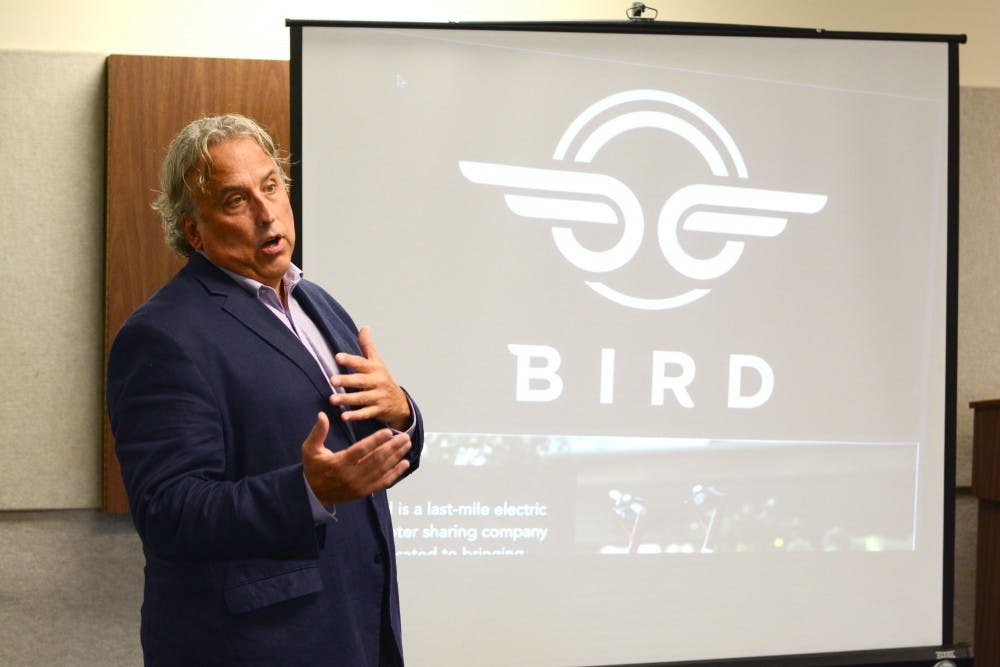Bird scooters are headed to Oxford in the next few weeks. The electric scooters (e-scooters), which have become popular in larger cities across the U.S., can be used as an alternative mode of transportation that can help improve access to public transportation, decrease Oxford's carbon footprint and are relatively easy to use.
Bird scooters will co-exist within the framework of the bike infrastructure enforced on Miami's campus and the City of Oxford. Riders would be required to follow all traffic laws and would under no circumstance be allowed to ride on sidewalks. Helmet-wearing, while not legally required, is strongly encouraged while riding an e-scooter.
As of now, you cannot ride Bird scooters on campus, per university policy set in July.
However, that could eventually change in light of Miami Associated Student Government's (ASG) recent support for reevaluating the university's e-scooter policy.
Here's what you need to know:
Safety and community well-being
Riders must be 18 years old or over, must provide pictures of their government-issued driver's license in the Bird app and must to go through a scooter introduction module on the app to understand how to use the scooter properly.
"Bird Watchers," or community reporters, can sign up through the app to keep an eye on the community to make sure the scooters are used appropriately. The watchers can monitor scooter parking, rider etiquette and any other concerns that may present themselves.
The scooters always have headlights on, regardless of the time of day or weather conditions, to provide extra light for the riders and increased visibility of the rider to other traffic. The break lights will similarly always light up.
Both of the rider's hands must be on the handlebars for the scooter to function. Phone use is severely limited by this feature, thus helping to prevent accidents.
The scooters have a maximum speed of 15 mph, but the scooter's level of charge and the rider's weight will both factor into how fast the scooter will travel. The less charged and heavier the passenger, the slower the scooter will go.
Enjoy what you're reading?
Signup for our newsletter
A rider must provide their own helmet or purchase one from Bird for $1.99. Bird Rides, Inc. plans to hold free helmet giveaway events in Oxford that could involve free food and activities as incentives for people to pick up a helmet.
Riders who damage property and/or the scooter itself will be penalized and pay for damages. If injury or damage results from a scooter malfunction, Bird's insurance policy will cover the associated costs.
Bird's accident statistics are one in every 30,000 rides, which is comparable to the accident rate of regular bicycles, according to the representative from Bird Rides, Inc. at the recent presentation held by SCRC.
Bird Rides, Inc. will share revenue from the scooters with the City of Oxford. The city will receive $1 per day, per scooter in operation. The initial scooter fleet will be comprised of 100 scooters, so the city will receive $100 per day from Bird Rides, Inc.
The fleet will be removed from the streets in cases of snow or ice. They will either be housed by the local Bird catchers for short-term stays or in a local storage unit for months-long periods of bad weather.
Logistics
The scooters will be located at "Nest locations," where they will be scattered around town every morning to be picked up and used. The nest locations will be determined by data analytics, so more scooters will eventually be congregated in the most trafficked areas.
Riders can access the scooter by checking in on the app to start the ride. Once the rider reaches their destination, they must appropriately park the scooter and take a picture of the parking job to ensure proper parking etiquette.
The average cost per ride is around $3, and rides are typically between eight to 10 minutes long, on average. It costs $1 to begin the ride, and riders are charged an additional 20 cents per minute. The costs are entirely calculated per ride, and there is no flat membership fee. Fees cannot exceed more than $100 per day.
Bird Rides, Inc. will offer an affordability package to those community members who can legally prove they are members of low-income households.
The scooters will be taken off the streets after 9 p.m. by paid local contractors who will then take the scooters to their home to charge overnight. The contractors, or "Bird Catchers," are paid $5 per scooter per day. Sometimes, when a lone scooter is stranded in a far-away area, a bounty is placed on it until it is picked up. The bounty can escalate up to $20.
The cycle begins again when the scooters are placed back at the nest locations at 6 a.m. the next day.
The contractors cannot be any students that live on campus, as the scooters cannot be inside school buildings, much less on campus.
Local businesses or individuals can apply to be scooter mechanics, and Bird Rides, Inc. will contract out repairs locally to keep the fleet functioning at its peak performance.
haubence@miamioh.edu




